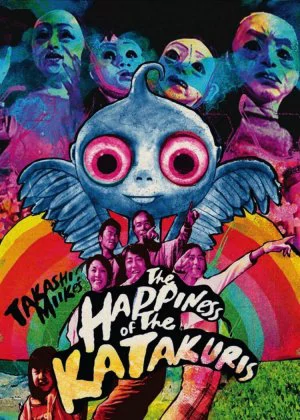The Happiness of the Katakuris
Saying Takashi Miike has an incredibly rich and expansive oeuvre is an understatement. By now the man has worked in just about every genre imaginable, often mixing several genres within a single project. I watched a lot of his output when I was just getting serious about film, every so often I take the time to revisit some of my favorite Miikes. This time around I popped in The Happiness of The Katakuris [Katakuri-ke no Kôfuku], a strange and wonderful feature that combines musical elements with comedy and claymation. If that sound a little strange, be warned that it doesn't even begin to describe the weirdness that lies ahead.
![screen capture of The Happiness of The Katakuris [Katakuri-ke no Kôfuku]](/thumbs/img/articles/1200xauto/happiness-katakuris-1.webp)
Back in the day, it was both easier and harder to keep up with the work of Miike. On the one hand he was making up to six films per year, which did require some dedication to keep track of everything. On the other hand his films actually got released in the West, so there wasn't an endless wait for them to appear in some for or another. The turn of the century is when Miike really started to make a name for himself, releasing completely unique and baffling films at breakneck speed. The Happiness of The Katakuris is one of the films that helped to cement that image.
On paper, the film is a remake of The Quiet Family (1998), a South-Korean dark comedy that features the same plot setup. While the films share very similar premises, it's pretty much impossible to compare the two as Miike added a bunch of musical interludes and some claymation segments to spice things up (or, as he explains in the extras, to keep the budget down). This unlikely combination of genres and technologies is what gives The Happiness of The Katakuris its particular flavor, apart from the regular Miike oddities that are sprinkled throughout the film of course.
The Happiness of The Katakuris follows the Katakuri family as they attempt to start up a bed and breakfast on a remote mountain, pre-empting the construction of a big road right next to their little lodge. The construction of the road gets delayed though and clientele is scarce. Things get worse for the family when their very first client commits suicide in his room. Eager to avoid bad press, they decide it's better to bury the corpse rather than notify the police. What they don't know is that this is only the start of their incredible stroke of bad luck.
![screen capture of The Happiness of The Katakuris [Katakuri-ke no Kôfuku]](/thumbs/img/articles/1200xauto/happiness-katakuris-2.webp)
Miike, certainly in his early days, wasn't the most refined director. While he was overflowing with crazy, nifty ideas, he rarely had the time and budget to execute them properly. So it all comes down to how lenient you are willing to be when balancing intent and execution. The Happiness of the Katakuris is clearly not the most flamboyant musical you'll ever see, nor is it the slickest claymation feature. But the mix of styles, the dedication to execute the original ideas without compromise and the tongue-in-cheek styling all make this a truly worthwhile visual experience.
This being a Japanese musical means that most people will need some time to adapt to the Japanese songs, not in the least because they're all delivered in a very cheesy, over-the-top way. The actors are lousy singers and they're clearly not the best dancers either, but there's a jolly, uplifting and overstated quality to the songs and choreography that give the film a solid comedy edge. I wouldn't suggest buying the soundtrack, but the songs are memorable and good for more than just a couple of laughs, so in that respect Miike did a solid job with the music.
The acting too is well overstated. Broad gestures, extreme emotions, thick caricatures, it's all here. You're not watching this one for the deeply emotional and tormented performances, that's for sure. Luckily the cast is well aware of what is expected of them, and they oblige gracefully. All members of the family do a solid job, but it's the secondary characters (Kiyoshirô Imawano as Richard Sagawa and Naoto Takenaka as the reporter) who stand out the most. Some familiarity and appreciation for Japanese comedy is a must though, otherwise I'm sure the overacting can get a little obnoxious.
![screen capture of The Happiness of The Katakuris [Katakuri-ke no Kôfuku]](/thumbs/img/articles/1200xauto/happiness-katakuris-3.webp)
Like most Miike films, The Happiness of the Katakuris is pretty lengthy for what is little more than a goofy, nonsensical film. People who need a solid plot to keep themselves engaged might find that the film drags a little, especially during the second half. I can't say it bothered me a lot, there's plenty of madness, variation and crazy ideas to fill the time, all of which kept me entertained throughout. While there's only a handful of scenes that might've benefited from a little extra editing, in the end there's very little cruft.
The Happiness of the Katakuris is one of films that established Takashi Miike's reputation as a madman director, and as such is a must-see for people wanting to get acquainted with his work. It's a film that combines a myriad of crazy ideas and styles, blending black comedy, musical and claymation as if it was the most normal thing in the world. To Miike's credit, he makes it all work. It's an essential entry in his broad and varied oeuvre, a film with ample rewatch value and a boatload of unadulterated fun. It's not his most accessible of his films, but if that's what you're after then maybe Miike isn't the best choice to begin with.
